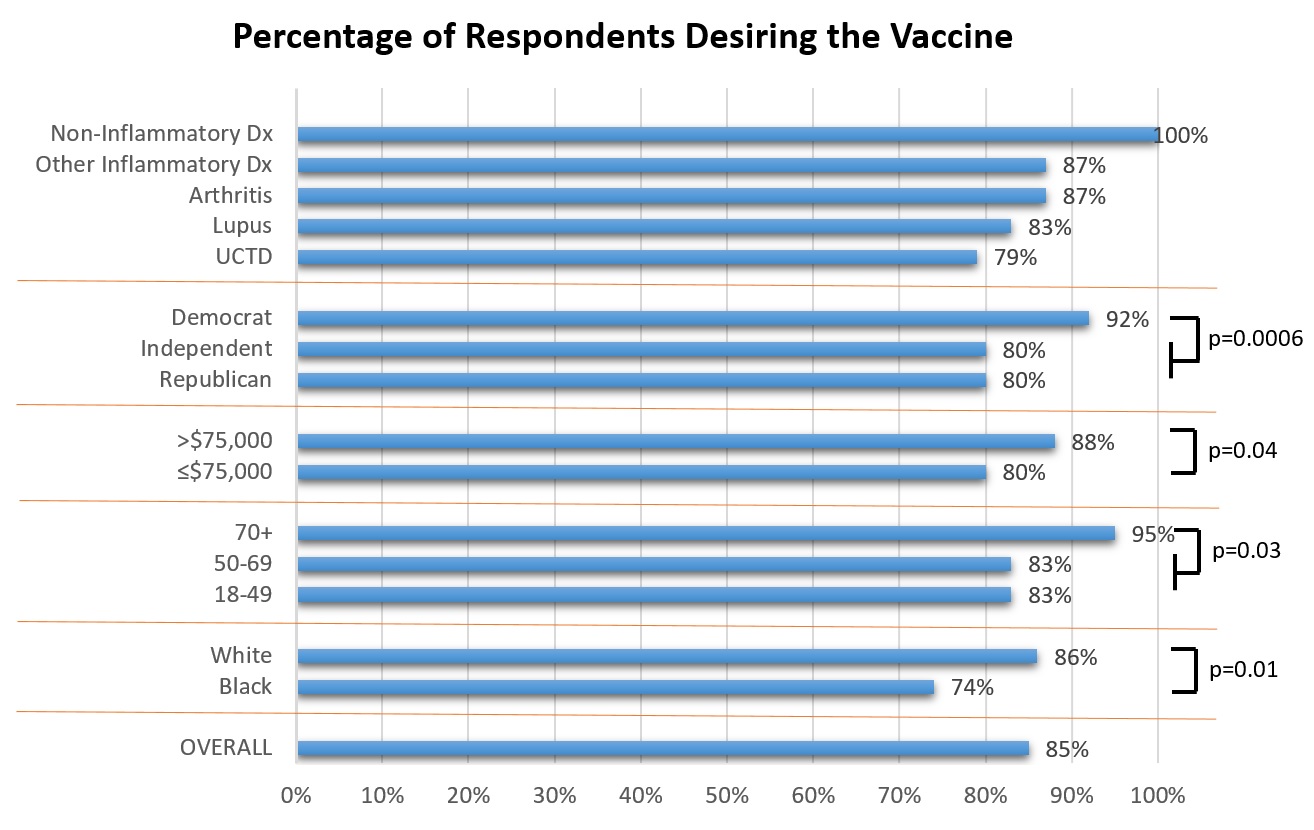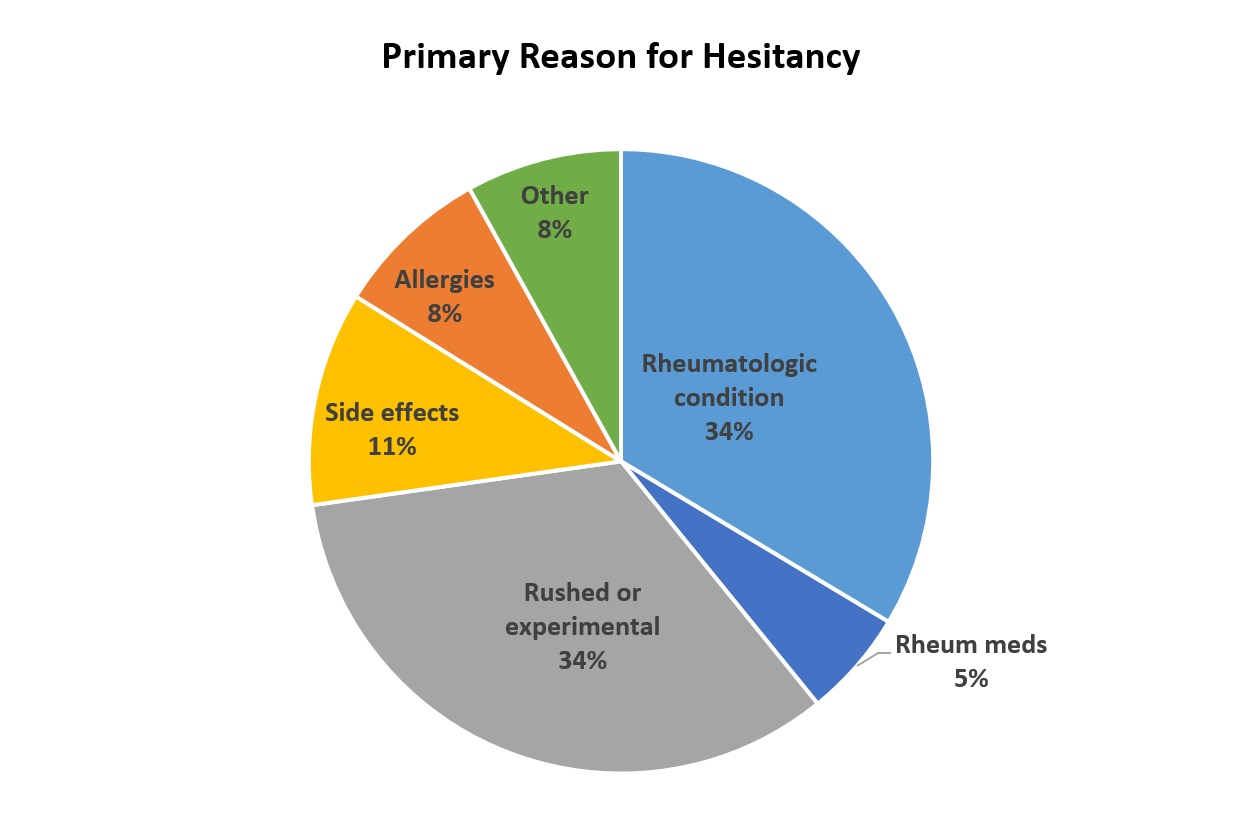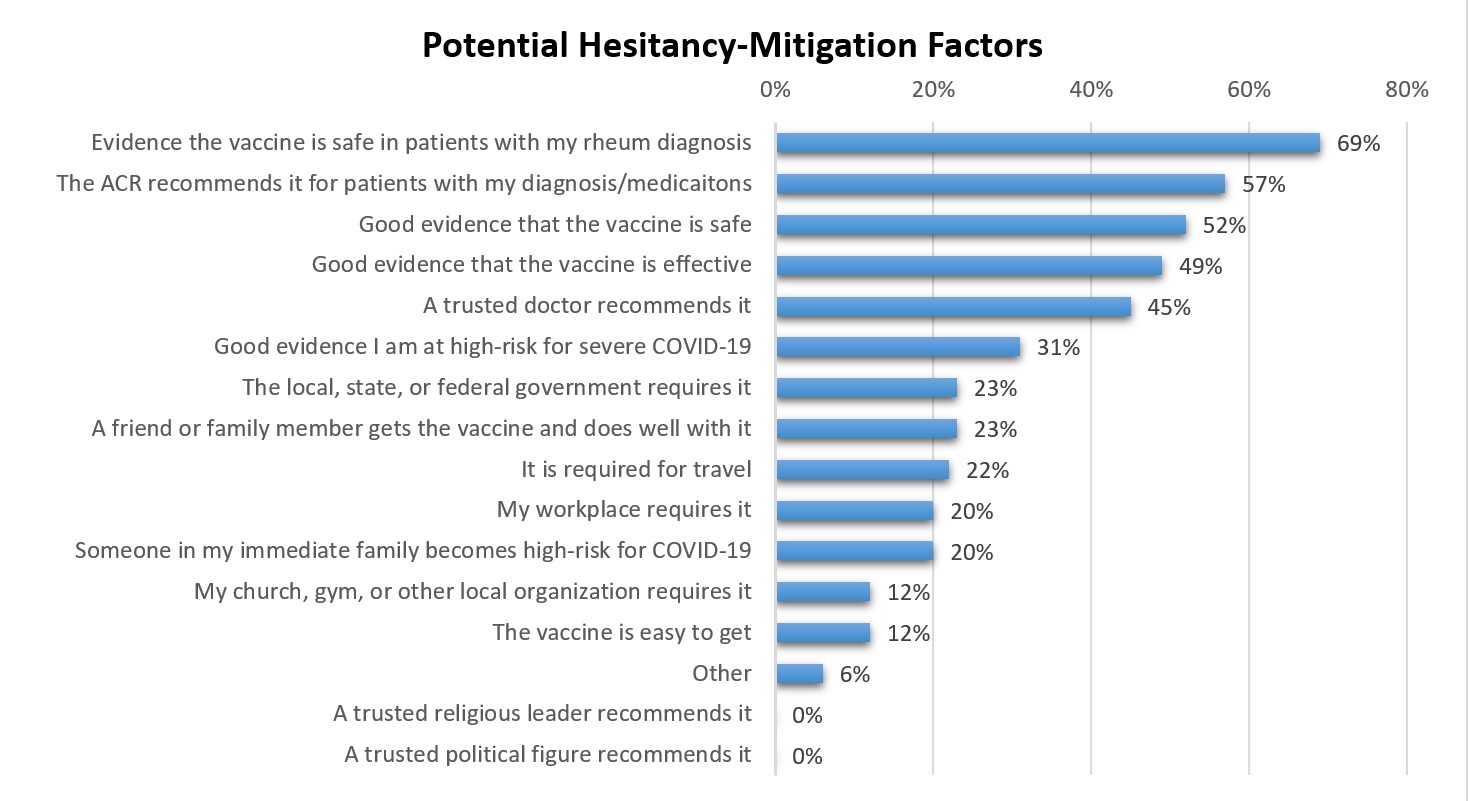Session Information
Date: Tuesday, November 9, 2021
Title: Patient Outcomes, Preferences, & Attitudes Poster IV: COVID-19 (1589–1613)
Session Type: Poster Session D
Session Time: 8:30AM-10:30AM
Background/Purpose: Patients with rheumatic diseases on certain immunosuppressant medications are known to be at higher risk for severe COVID-19. The ACR recommends COVID-19 vaccination for nearly all patients with rheumatic diseases. However, some individuals remain hesitant to receive a COVID-19 vaccine. This study assessed the basis for COVID-19 vaccine hesitancy in rheumatology patients. This study assessed the basis for COVID-19 vaccine hesitancy in rheumatology patients seen at a large academic medical center in the Southeastern United States.
Methods: A survey was distributed electronically during the last week of December 2020 and the first week of January 2021 (when in the US, COVID-19 vaccines were available only to health professionals) to rheumatology patients at a large academic center in the Southeastern United States. Patients completed a COVID-19 vaccine belief survey, adapted from the Vaccine Hesitancy Scale (VHS), along with a demographic survey. Patients were asked whether they would get a COVID-19 vaccine and responses were dichotomized as definitely/probably vs probably not/definitely not. Descriptive statistics and logistic regression models evaluated factors associated with vaccine hesitancy.
Results: A total of 433 patients responded to the survey: 48% self-identified as having inflammatory arthritis, 83% as female, 4% as Hispanic, 10% as Black, and 50% as a member of the Democratic Party. Individuals who wanted the COVID-19 vaccine had less hesitancy on 3 survey subscales (p< 0.001). Of respondents who identified as White, 86% wanted to receive the vaccine, in comparison to 74% of respondents who identified as Black (p=0.04) (Figure 1). Patients over the age of 70, with income >$75,000, or identifying as Democrats were also more likely to desire COVID-19 vaccination. Backward regression models identified White race (OR: 4.43; 95% CI: 1.80, 10.98) and affiliation with the Democratic Party (OR: 4.20; 95% CI: 1.93, 9.20) to be independently associated with wanting the vaccine. The primary reasons cited for hesitancy were: the vaccine being “rushed” or “experimental” (34%), safety of the vaccine in the context of patients’ rheumatologic diagnoses (34%), side effects (11%), and concern for allergic reaction (8%) (Figure 2). Common reasons for vaccine-hesitant patients to consider getting the vaccine were: “evidence the vaccine is safe in patients with my rheumatic condition” (69%) and “the ACR recommends it for people with my condition” (57%) (Figure 3).
Conclusion: Rheumatology patients wanted to be vaccinated against COVID-19 at a rate that was higher than national surveys estimates (85% vs 60-69%) during the same time period. As in national surveys, White race and Democratic Party affiliation were strongly associated with rheumatology patients wanting the vaccine. More than one third of patients revealed factors related to their rheumatologic diagnosis as the primary reason for their hesitancy. Importantly, the majority of patients indicated that they would be more likely to get the COVID-19 vaccine based on recommendations from the ACR or their rheumatologist, or in the setting of evidence of vaccine safety in rheumatic conditions.
 Figure 1. Vaccine hesitancy by rheumatic diagnosis, political affiliation, household income, age, and race.
Figure 1. Vaccine hesitancy by rheumatic diagnosis, political affiliation, household income, age, and race.
 Figure 2. Patients’ stated primary reason for COVID_19 vaccine hesitancy (free-response question with qualitative data coded by theme).
Figure 2. Patients’ stated primary reason for COVID_19 vaccine hesitancy (free-response question with qualitative data coded by theme).
 Figure 3. Factors rheumatology patients indicate would increase the likelihood of their opting to receive the COVID_19 vaccine in the future (multiple-choice, “select all that apply” question).
Figure 3. Factors rheumatology patients indicate would increase the likelihood of their opting to receive the COVID_19 vaccine in the future (multiple-choice, “select all that apply” question).
To cite this abstract in AMA style:
Sadun R, Eudy A, Rogers J, Sun K, Criscione-Schreiber L, Maheswaranathan M, Doss J, Clowse M. COVID-19 Vaccine Hesitancy in Rheumatology Patients [abstract]. Arthritis Rheumatol. 2021; 73 (suppl 9). https://acrabstracts.org/abstract/covid-19-vaccine-hesitancy-in-rheumatology-patients/. Accessed .« Back to ACR Convergence 2021
ACR Meeting Abstracts - https://acrabstracts.org/abstract/covid-19-vaccine-hesitancy-in-rheumatology-patients/
